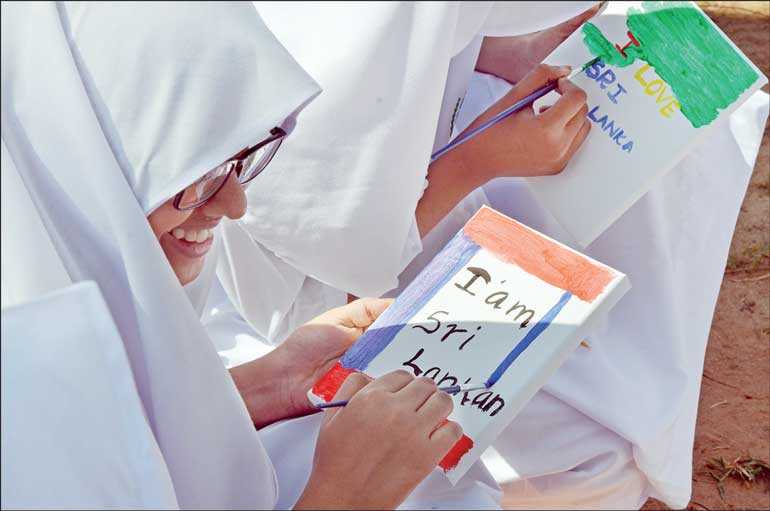Monday Feb 16, 2026
Monday Feb 16, 2026
Friday, 18 September 2020 00:30 - - {{hitsCtrl.values.hits}}

A LAND LIKE NO OTHER – towards a truly far more inclusive pluralistic and yet peaceful inclusive nationality: not predicated on race or religion; but the reality of being bounded by an ocean of other-ness – Pic by Shehan Gunasekara
There is an emerging trend in nationalism that warrants closer inspection. Not that the phenomenon hasn’t raised its head to crow before, like a mad rooster on a sordid dunghill. But this time, it’s a thing of some ‘truth’ and ‘beauty’. And now, if  only we can include ‘justice’ and ‘goodness’ in chanticleer’s clarion, we would be one step closer to being that all-inclusive island-race... as well as the classical definition of what it takes to be human.
only we can include ‘justice’ and ‘goodness’ in chanticleer’s clarion, we would be one step closer to being that all-inclusive island-race... as well as the classical definition of what it takes to be human.
Some champions of this new version of that concept are scratching at the surface of its old ethics. They claim that most islanders are clearly ‘Sinhalese-Buddhists’. And that all others are adjuncts or corollaries of the same. For instance, there is no such thing as a ‘Roman’ Catholic in Sri Lanka today – or ever… but purely and simply a ‘Sinhalese-Buddhist’ Catholic.
Of course, such nationalistic inclusivity is rarely pure… and never simple – especially when its ambit extends to encompassing such troubling paradigms as ‘Sinhalese-Buddhist’ Muslim.
Let us, however, willingly suspend disbelief. And examine the contention. That we may talk together of men or mice…
Premise
In its purest and simplest form, the premise stems from the worldview of an ardent self-confessed nationalist who has served the state well. It remains to be seen whether his largesse will embrace the rest of our island-race without disturbing the peace of pluralism. As well as the right to define one’s own identity and practise one’s religion in the pursuit of life and liberty.
His argument maintains that there are no ‘pure’ or ‘simple’ forms of racial or religious identity. Rather, their character is rooted in the dankness of the soil that received its seed. So, for instance, a Muslim in Sri Lanka is not an Arab Islamist but a Sri Lankan Muslim. So far, so good… but he (and presumably they, because this isn’t a one-man-show?) goes a step farther – to claim that such a member of the faithful to the Prophet is a ‘Sinhalese-Buddhist’ Muslim. One whose being and blessedness is based on his or her ‘native’ national identity.
Shall we do this contemporary philosopher a disservice by making him out to be a racist at best or chauvinist at worst? By no means! Because he is at pains to portray himself as neither a bigot nor a xenophobe...
He is, by his own estimate, simply proud to be ‘Sri Lankan’ (aren’t we all?) – being purely desirous of a far simpler and identifiable nationalism. Let’s also admit as being noble and honourable his distinction between being simply national-minded (‘jaathi-kathwaya’) and ultra-nationalistic (‘jaathi-waadaya’). The former is to be embraced. The latter is to be eschewed.
However noble this honourable nationalist’s intentions may be, his ideas are – again, by his own admission, in a much publicised interview now on social media – limited to his reading, worldview and philosophy.
At worst, they could be condemned out of hand by any one of many contesting nationalisms that occupy the Sri Lankan heart and mind sphere. At best, these could be critically engaged by those genuinely invested in the national project.
So that through dialogue, dialectical analysis and friendly enough conversation among fellow-islanders, a consensus could be arrived at to the profit and pleasure of all. It may even take us a step closer together to the evasive all-inclusive and pluralistic national identity that could well bring us nearer the unity and harmony we – and, no doubt, he – crave.
Presumption
First, we agree that Buddhism is not a religion – or, by his yardstick, not even a philosophy – but a teaching. It is a great teaching at that, and has stood the test of time... being put on trial by those who misunderstand that Man and his Mind enough to worship him. Among the other salutary virtues that the Four Noble Truths and the Eightfold Path teach – in other words – are truth, beauty, justice, goodness.
Not only Sinhalese. But also Tamils, Moors, Malays, Burghers – as well as other sub-constructs of those subscribing to race-based national identity markers – can well subscribe to the Enlightened One’s teachings. And even those of other discernibly different world religions that are ‘guests’ here – Hindus, Muslims, Christians, et al. (a nod to you atheists and agnostics) – can adopt, admire and at best apply the old wise Tathāgatha’s teachings.
In short, we can be better Tamil Hindus or Dutch Burghers by admitting metta, karuna, muditha, upekkha, to our pongal or lamprais, as much as heel batha. Pity then that a few errant and egregiously nationalistic Sinhalese-Buddhists don’t appear as willing, ready, and able to do so – as say the late Srilankabhimanya Lakshman Kadirgamar or the late Deshabandu Geoffrey Bawa were evidently able, ready, willing to. Admittedly (and our avant-garde thinker says so too) these trouble-makers are few and far between – but their path intersects the orbits of the powers that be at an all-too dangerous angle and has set Sri Lanka’s vector on a challenging tangent once too often. Politics and religion mix explosively.
Then again, we can agree that violently contesting nationalisms have no place in our formerly peaceful society. Of course, he may be sincerely mistaken in assuming that the books of other religions – notably, in his view, the Abrahamic faiths – give licence to essentialism and particularity in a way that Buddhism doesn’t.
True that missionary faith often combined bibles and rifles in a rather abominable barrage of fire and faith. But we mustn’t hold bishops accountable for the shallow faith of businessmen; or vice versa. Besides, philosophies and teachings have had some egregious liberties taken in their name... in our time... ’nuff said. Except to say that founders of faiths are not responsible for all of their followers!
It would do all of us good to remember that Buddha and Christ both taught the value of humanity while speaking truth to power in their own times. The latter to undermine the dehumanising brutality of the then Roman Empire. The former to challenge the crippling slavery of ritualism and enshrinement of priests through formalisation of traditional worship. One paid the price for his outspokenness with a public crucifixion. The other may have seen fellow-sufferers make others pay the price for doctrines he would disown today as variant or deviant. Their revolutions succeeded for a while with the early Jesus ‘Way’ of the first three centuries AD; and the AbiDharmist ethic of even today, wherever it exists as a pure and simple teaching and praxis of Gautama Siddhartha’s ‘Path’.
Praxis
Similarly, if the faithful of an ancient oriental religion insist on mindlessly applying the movement of desert lands to modern society, they would be guilty of being faithless to a civilizing force in the early Middle East that gave the medieval world algebra and astronomy among others. As well as modern Sri Lanka the boon of wattalappam (though the bane of wahhabism brings up no small amount of bile) through its interaction with Serendip since the time of Ibn Battuta.
There are infidels in every camp. None more so who would deny the trends and realities of trade winds and histories or narrative they may rewrite – from the legends of warrior-kings to myths about exiles to Lanka or explorers of Serendip. And those who refuse to read and learn their lessons may be sharply disappointed at the recalcitrance of others equally embedded in their own meta-narratives. As much as would-be philosophers are welled up with pure and simple pride at their airy imagination giving to foreign spirits a local habitation and a name…
And last but by no means least: we must embrace the model of inclusivity that our imaginative nationalist modulates so well. But for the simple matter of his nomenclature! And there is a pure power in the naming of things that cannot be so simply dismissed, without consequence to the body politic, much less the harmonious coexistence of beings.
Tell someone that they’re a ‘Sinhalese-Buddhist’ Muslim and they might be moved to show you the error or your ways in cash or kind – or a dearer currency of flesh and blood. Speak to a Catholic about being ‘Sinhalese-Buddhist’ and they may not turn the other cheek, as if it were a cardinal virtue – no pun intended.
However much we may all be rooted in a majoritarian soil which owes much if not most of its character to an ancient civilisation that self-identifies as ‘Sinhalese-Buddhist’, would we not be on safer ground to aspire to a larger identity than that? Aren’t we all ‘Sri Lankan’ first and last? If, as that troublesome politician Vigneswaran noted, only this week: “Tamil was spoken in Lanka before Sinhala was…” and the occupants of southern India were Buddhists before any of us islanders were, aren’t we all adrift in the ocean of some samsaric hybridity?
Thus, could we invite our champions of a more inclusive pluralistic national identity to keep their love of an ancient and noble civilisation, and ambitiously label its ethos more inclusively? For example, I can be a better Christian by following more closely the Buddha’s footsteps along a noble forest path to an honourable arbour. But may I be permitted by the gracious sons of the soil who see themselves as my ‘hosts’ along my lonely way to retain my cherished minority identity that in no way diminishes my larger belonging to the all-embracing Mother: Sri Lanka?
I am a ‘Christian’ by birth and baptism. But very much – on closer inspection by friends who know me and family who trust my judgment – a ‘Buddhist’ in my detachment from priest-craft; cheap salvation; and mindless customs, traditions, and rituals. As well as my understanding that while ‘sabbe sancara anicca’ is true, yet ‘sabbe saththa bhavanthu sukhi-taththa’ is a larger benison we may still extend to one another.
Do I hedge the case? Yes, I do and so do you too. We are large, we contain multitudes. We share 95 per cent of our chromosomal matter with rats. Yet we are far more than beings in a laboratory with no instrumentality of our own – unless we voluntarily embrace such bondage or servitude. Better to be free in a blessed land that embraces all her children – even or especially, the nameless or faceless – than be slaves to labels that limit and philosophies that enslave heart and mind.
(Journalist | Editor-at-Large of LMD | Writer on inclusive pluralism | Student of strange trade winds)